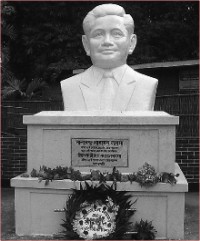| Journey Through
Bangladesh
From Khagrachhari
Manabendra Narayon Larma
A profile of the man they call "Father of the Jumma Jati"
Jasim Majumder
 Manabendra Narayon Larma had led 13 minor indigenous communities in Chittagong Hill Tracts for nearly three decades, and these communities remember him for his outstanding contributions and sacrifices. He is referred to by many in the Chittagong Hill Tracts region as the 'Father of the Jumma Jati (Indigenous race)'. Manabendra Narayon Larma had led 13 minor indigenous communities in Chittagong Hill Tracts for nearly three decades, and these communities remember him for his outstanding contributions and sacrifices. He is referred to by many in the Chittagong Hill Tracts region as the 'Father of the Jumma Jati (Indigenous race)'.
On behalf of the indigenous groups that call the hill tracts home, he had consistently raised his voice to make their demands heard to the government. He was the founder of the highly controversial group 'Shanti Bahini'. He had made major contributions towards the realization of the Chittagong Hill Tract's peace accord. He died on 10 November 1983, killed by his own party's men in an internal feud.
Childhood and Family
Manabendra Narayon Larma alias Monju was born on September 15, 1939 at Mohapurom village under Naniarchhar thana in Rangamati district. Mohapurom village was submerged when the Kaptai Hydroelectric dam was built in 1962.
Manabendra, the third child of Chitto Kishor Chakma and Suvasini Dewan, had three brothers and a sister including elder sister Jyotyprava Larma alias Minu, elder brother Suvendhu Pravash Larma alias Bulu and younger brother and the running Chittagong Hill Tracts Regional Council Chairman Joytyrindra Bodhipriya Larma alias Santu Larma.
Education
Manabendra completed his primary level education from his village school Mohapurom primary school in 1950 and his SSC from Rangamati Government High School in 1958. He then went on and completed his intermediate in 1960 and his Bachelor of Arts (BA) in 1965 from the Chittagong Government College. He furthered his education and completed Bachelor of Education (B,Ed) in 1968 from Chittagong B.Ed college and LLB from Chittagong Law College in 1969. He joined the Chittagong BAR Association as a barrister in 1969 as well.
Career and Politics
His career started with teaching when he joined Dighinala High School under Dighinala upazila in Khagrachhari in 1966 as Assistant Teacher. After serving in the position till 1968, he joined Chittagong Railway High School as Headmaster.
Manabendra Larma has been involved with politics from his boyhood, and was encouraged by his father Chitta Kishor Chakma and elder Uncle Krisna Kishor Chakma, who also worked for the betterment of the minor indigenous communities. Manabendra joined student politics in 1956. To bring unity amongst indigenous students he initiated a council in 1957 under the banner of Pahari Chhatra Parishad (PCP) and also joined Chhatra Union politics in 1958. He was arrested for the first time on February 10, 1963 from indigenous student's hostel at Pathorgata, Chittagong because he and some other indigenous leaders protested the decision of building the Kaptai Dam. He was released from jail on March 8, 1965.
He was elected as Member of the parliament in 1970 from 'Parbattya Chattagram Uttar Ashon' (Chittagong Hill Tracts north seat). After the liberation war of 1971, he submitted a 4-point demand to the then prime Minister Banghabandhu Sheikh Mujibor Rahman for full autonomy as a parliament member, but the appeal was denied. He formed the leading indigenous forum 'Parbattya Chhattagrame Jana Sanghity Samity (PCJSS) in 1972 and served as its first General Secretary. He was also elected as the President of PCJSS later in the year.
He joined 'BAKSAL' in 1974 and went into hiding on August 16, 1975, the day after Bangabandhu Sheikh Mujibur Rahman was killed along with his family member. He continued to advocate for the rights of people of the hill tracts till the day he passed away. He was killed on November 10, 1983 by his own party's cadres Bobotosh Dewan alais Giri, Priti Kumar Chakma alais Prakash, Dejoyti Chakma alias Deven and Tribongil Dewan alais Polash. Most of the indigenous leaders believe that the PCJSS lost a lot of its vitality and spirit after the death of its founder.
Copyright
(R) thedailystar.net 2009
|

 Manabendra Narayon Larma had led 13 minor indigenous communities in Chittagong Hill Tracts for nearly three decades, and these communities remember him for his outstanding contributions and sacrifices. He is referred to by many in the Chittagong Hill Tracts region as the 'Father of the Jumma Jati (Indigenous race)'.
Manabendra Narayon Larma had led 13 minor indigenous communities in Chittagong Hill Tracts for nearly three decades, and these communities remember him for his outstanding contributions and sacrifices. He is referred to by many in the Chittagong Hill Tracts region as the 'Father of the Jumma Jati (Indigenous race)'.